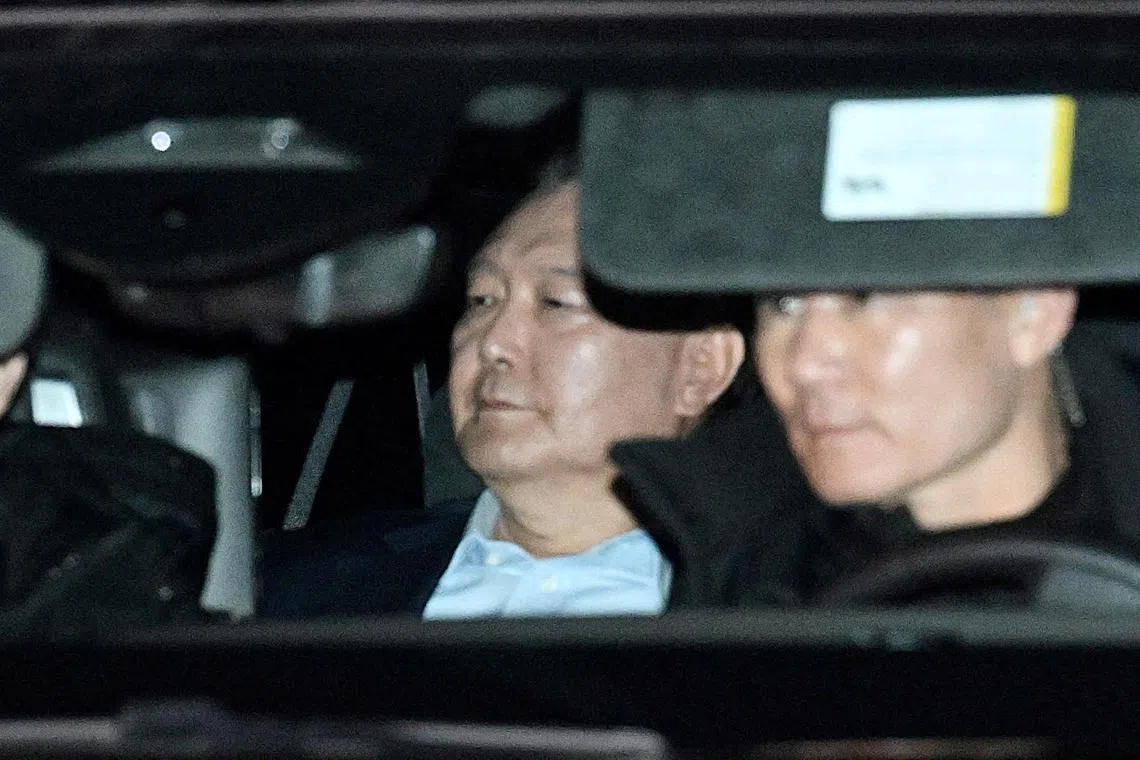Yoon’s lawyers, National Assembly wrangle over legitimacy of martial law decree at second hearing
Sign up now: Get ST's newsletters delivered to your inbox

South Korea's impeached President Yoon Suk Yeol en route to a detention centre in Seoul on Jan 15, following his arrest.
PHOTO: REUTERS
Follow topic:
SEOUL – Suspended and now arrested President Yoon Suk Yeol’s second formal hearing in his impeachment trial was held at the Constitution Court of Korea on Jan 16 without his attendance but with his legal representatives trying hard to justify his declaration of martial law
The second hearing marked the first time that Mr Yoon’s side formally articulated its stance on key issues during the trial, emphasising the context and circumstances surrounding his Dec 3 botched imposition of military rule.
Mr Yoon’s first hearing on Jan 14 ended after a little more than four minutes because of his absence, based on his concern that investigators might arrest him via a court-ordered warrant, according to his lawyers.
Jan 16’s hearing began with the National Assembly’s Impeachment Committee listing the reasons why Mr Yoon must be removed from office.
It outlined five constitutional violations as grounds for confirming Mr Yoon’s impeachment: his declaration of martial law, his ordering the obstruction of parliamentary activities through the deployment of military and police forces, his ordering of the warrantless raid of the National Election Commission, his issuance of Martial Law Decree No.1 and his orders to arrest and detain a list of prominent political figures and outspoken critics.
Representative Jung Chung-rae, chair of the National Assembly’s Legislative and Judiciary Committee, accused him of violating the Constitution and disrupting national order through his martial law declaration on Dec 3.
“The South Korean Constitution states that the sovereignty of the Republic of Korea resides with the people, and all state authority emanates from the people. And the power, entrusted by the people, cannot unconstitutionally or unlawfully rule over the people,” Mr Jung told the justices, quoting from the Constitution Article 1, Clause 2, during his argument.
“(For Mr Yoon,) there isn’t even a shred of will to uphold the Constitution. There’s suspicion that, if reinstated, he might attempt to commit martial law a second time.”
His legal team contested the legality of the impeachment process itself.
“The Republic of Korea’s Constitution has been destroyed,” Mr Yoon’s newly added legal representative Cho Dae-hyun, who is also a former Constitutional Court justice, told justices, in a trembling voice.
“The majority in the National Assembly unlawfully pushed for impeachment by accusing the President of insurrection and threatened to arrest him. As a result, the President couldn’t attend the first hearing at the Constitutional Court. Detained in a detention centre, he ultimately couldn’t appear at the second hearing today either,” Mr Cho said.
Meanwhile, earlier in the day, the court rejected Mr Yoon’s request to reschedule the second hearing, citing “no sufficient reason” to do so.
The court’s press officer Cheon Jae-yeon told reporters that all eight justices discussed the matter and decided to dismiss Mr Yoon’s request to reschedule.
Mr Yoon’s lawyers had, a day earlier, submitted the postponement request following his arrest, arguing that proceeding with the hearing while he is in custody would deprive him of his right to attend the trial.
But the court said Jan 16 that it had not received any information or indication from Mr Yoon’s side so far on concretely when and how he plans to attend the hearing.
Initially, his team has repeatedly stressed that Mr Yoon would appear in court “at an appropriate time” to defend himself and explain the reasons behind his actions.
According to Article 52 of the Constitutional Court Act, defendants are not required to appear in court for their hearing. If a defendant decides not to attend more than once, the court will proceed with their trial in their absence.
On Jan 16, the court also confirmed that Mr Yoon’s legal representatives had appointed additional representatives – former Constitutional Court justice Cho Dae-hyun and former prosecutor-general Gong Sang-myeong – both of whom served during the Roh Moo-hyun administration. This brings the total number of Mr Yoon’s legal representatives to 14.
The court also added that the Seoul Central District Prosecutors’ Office submitted additional investigation-related documents on the afternoon of Jan 15. THE KOREA HERALD/ASIA NEWS NETWORK

